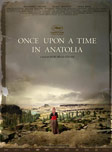
|
Long and winding road has a worthwhile destination in Turkish film David Stratton, The Australian, 2 June 2012
SOME films demand to be seen on the big cinema screen, and Once Upon a Time in Anatolia, the latest from the masterly Turkish director Nuri Bilge Ceylan, is one of them. Sadly, its Australian release seems to be so limited that most people may be forced to see it in inevitably reduced conditions on DVD or via legal (or possibly illegal) download. On the other hand, the new Mel Gibson shoot-'em-up, Get the Gringo, is getting a wide cinema release in Australia. This is in contrast to the US, where it by-passed cinemas and became a video-on-demand title. Presumably the powers that be reckon Mel still has a following here. Now the great masters of European cinema - the likes of Bergman, Fellini, Antonioni - are no longer with us, so-called art house cinema has changed. Denmark's Lars von Trier and Spain's Pedro Almodovar are certain to be given cinema screens for every new film they make, but some of the more interesting contemporary directors working in China, South Korea, Iran and Turkey are less likely to find automatic release, even after the success of A Separation (from Iran). Ceylan's films aren't likely to change that. The writer-director (and occasional actor) makes very personal and often very minimalist films in which the small details often count for more than the main narrative. Ceylan is best known for Distant (2002), a moving story in which a villager from the country lands on the doorstep of his city cousin who at first resents the intrusion, and for Three Monkeys (2008), in which the attempts of a politician to cover up a hit-and-run accident have unexpected ramifications. His latest, Once Upon a Time in Anatolia, which shared the Grand Prix in Cannes last year, could be described as a police procedural that unfolds on the wind-swept plains of Central Anatolia across the space of a few hours, mostly at night, in winter. A small convoy of official cars drives through the night on a mission to discover the whereabouts of a murdered man. In a brief prologue we see the victim, Yasar (Erol Eraslan), in what appears to be a bar, sharing drinks and food with Kenan (Firat Tanis) and his slow-witted brother Ramazan (Burhan Yildaz). What exactly happens next we never know. Ceylan cuts forward to the interior of the main car in which the local police commissioner, Naci (Yilmaz Erdogan), is escorting Kenan, who has confessed that he murdered Yasar, to show where he buried the body. Also in the packed car are Dr Cemal (Muhammet Uzuner), the local medical officer, prosecutor Nusret (Taner Birsel) and the driver, Arap Ali (Ahmet Mumtaz Taylan). The searchers, accompanied in the following cars by Ramazan and several police and gravediggers, are in for a frustrating experience. Kenan seems unable, or unwilling, to remember where he buried his victim and gives only the most general directions. In this remote region, on a mountain road, that's not much help to the increasingly frustrated officials. One tree looks very much like another. After a while the searchers stop in a small village where the more important among them are entertained by the mayor. Here, the lack of resources and infrastructure becomes a point of discussion as well as matters of jurisdiction. Not far into this challenging (more than 2 1/2-hour) movie it becomes clear that Ceylan, as usual, isn't as much interested in the aspects of crime and punishment as the film may at first suggest: it's the marginal aspects of the story that fascinate him. The relationship between the seen-it-all prosecutor and the young doctor, for instance, one a cynic the other an optimist, becomes more important as the film progresses. Discussions that at first seem relatively unimportant assume larger meaning, too. As in Distant, questions are raised about the attitudes of city-dwellers towards the people of Turkey's more remote and, it's suggested, insular regions such as Anatolia. The role of women in Turkish society rates more than a passing mention, and there's a lovely moment when, during the late-night supper at the home of the village mayor, there's an almost ghostly appearance of the official's beautiful daughter, a reminder of the role of women in Turkish society and a rare glimpse of a female character in this male-centric film (though the widow of the murdered man also makes a small but significant appearance). Another theme threaded through the film (and, indeed, through Ceylan's work as a whole) is the effect adultery has, not only on the adulterers but also on the people around them, while the role of children in society, and the hope for the future they represent, also forms part of the movie's rich pattern. Ceylan holds his cards close to his chest. This isn't a film in which everything becomes immediately crystal clear, but then surely the greatest and most enduring works of art pose a challenge at first acquaintance. As the long night unfolds and the characters reveal themselves and evolve, like images in a kaleidoscope, Anatolia's grip on the viewer increases. Apart from any other consideration, the film is stunningly well photographed by Gokhan Tiryaki in (mostly) available light: shots of the car headlights illuminating the rocky, hilly terrain, the moon illuminating a landscape, or the first streaks of light in the dawn sky provide a memorable backdrop to the human story unfolding, a story that contains surprising amounts of humour. Not for nothing has Ceylan been compared to Chekhov.
|
